[配套k12学习]七年级英语下册知识导学Module10Aholidayjourney词句精讲精练新版外研版
Module10Aholidayjourney-最新七年级下册各模块知识点汇总(含重点语法和练习)

Module 10 A holiday journey知识点详解一、词法1. meet v. 迎接;遇见,碰见;结识,被引见介绍eg:Will you meet me at the station? 你要到车站接我吗?I met him in the street. 我在街上遇见了他。
e and meet my family. 来认识一下我的家人。
2. excited adj. 感到兴奋的、激动的,表示人的心理感受,作表语时,主语为人。
exciting adj.令人兴奋的,表示某事(物)给人的感受,作表语时,主语为物。
eg: I was excited to hear the good news. 听到这个消息我很激动。
The exciting news made me feel excited. 这个令人激动的消息令我很激动。
3. any adj. 任何的只作定语,多用于疑问句、否定句或条件状语从句中。
后面可跟可数名词复数,也可跟不可数名词。
eg:He doesn’t have any books. 他没有任何书。
任何一个(三者或三者以上),用于肯定句中。
eg:You can buy the book at any bookshop. 你可以在任何一家书店买到这本书。
any用作代词,意为“无论哪一个,无论哪些”eg:If any of your friends is /are interested, let me know. 如果你的朋友们有谁感兴趣,告诉我。
4. tired adj.①疲倦的,劳累的After a day’s work, I feel tired. 一天工作之后我好累。
②厌倦的,厌烦的I’m tired of my boiled eggs. 我厌倦了煮鸡蛋。
5. relax v. 放松relax sb./oneself 放松某人/某人自己eg:I need a cup of tea to relax myself. 我需要一杯茶来放松一下。
七年级英语下册Module10AholidayjourneyUnit1Whatdidyoudo导学案
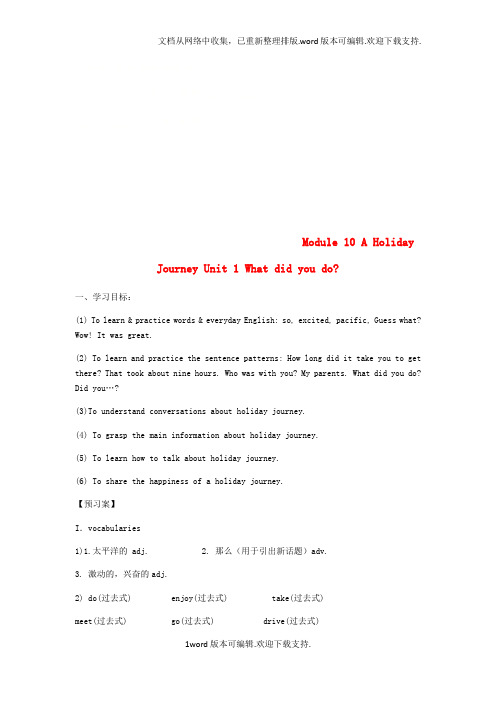
Module 10 A HolidayJourney Unit 1 What did you do?一、学习目标:(1) To learn & practice words & everyday English: so, excited, pacific, Guess what? Wow! It was great.(2) To learn and practice the sentence patterns: How long did it take you to get there? That took about nine hours. Who was with you? My parents. What did you do? Did you…?(3)To understand conversations about holiday journey.(4) To grasp the main information about holiday journey.(5) To learn how to talk about holiday journey.(6) To share the happiness of a holiday journey.【预习案】I.vocabularies1)1.太平洋的 adj. 2. 那么(用于引出新话题)adv.3. 激动的,兴奋的adj.2) do(过去式) enjoy(过去式) take(过去式)meet(过去式) go(过去式) drive(过去式)see(过去式) swim(过去式) stay(过去式)II. Group work.Talk about what you usually do on your favorite festival or holiday. Report it to your class. (Tips: who, what, where, how…)【探究案】III.Let’s talk. Work in pairs and talk about your ho liday activities.E.g. A: Hi, . Did you have a good time on May Day?B:Yes, / No, .A: What did you do?B: I .A: Wow, how nice. / Wow, it was great. / Oh, poor .IV.Pre-listening.1) Look at the pictures and guess.1. Where did Betty go for her holiday?2. Did she have a great time?3. What did she do?2) Find the places on the map. (P60)V. While-listening1)Listen and number the places as you hear them. (P60)2)Listen again and circle the correct answer.1. How did Betty get to L.A.?A. She flew there.B. She got there by ship.2.How did Betty get to her friends’ home?A. By underground.B. By car.3.Why was Betty excited at Disneyland?A. Because she met Snow White and Mickey Mouse.B. Because she liked Disneyland.4.How long did she stay in Disneyland?A. For two days.B. For three days5.Did she go swimming?A. No, she didn’t.B. Yes, she did.3) Listen and repeat.4) Complete the passage with the correct form of the words and expressions from thebox.Betty with her parents went to Los Angeles on holiday two years ago. They there. It them nine hours to fly there. Betty Snow White and Mickey Mousein Disneyland and she was . But she didn’t any movie star in Hollywood.She in the Pacific Ocean. She enjoyed it a lot. She is going to Paris this year.VI. Post-listeningWork in groups. Talk about a special holiday.VII. Homefun.Work in groups. Talk about a special holiday. Find out three same things, for example,the same place you visited, the same thing you did, and so on. Report it to yourclass next period.【训练案】VIII.按要求改写句子。
【初中】最新七年级英语下册知识导学Module10Aholidayjourney综合能力演练新版外研版
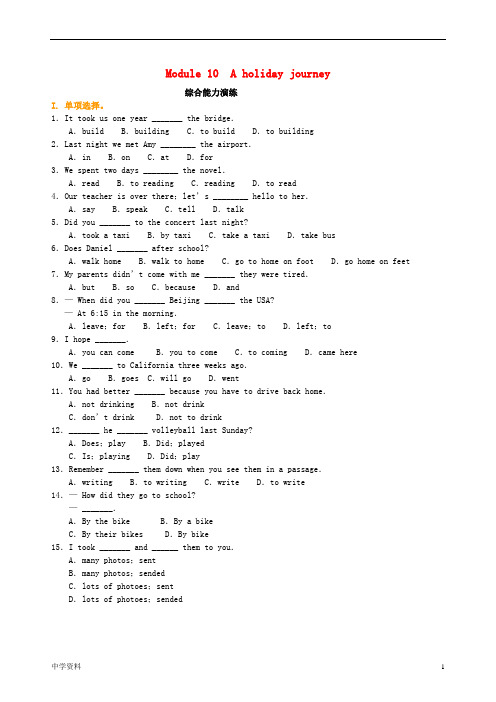
Module 10 A holiday journey综合能力演练I. 单项选择。
1.It took us one year _______ the bridge.A.build B.building C.to build D.to building2.Last night we met Amy ________ the airport.A.in B.on C.at D.for3.We spent two days ________ the novel.A.read B.to reading C.reading D.to read4.Our teacher is over there;let’s ________ hello to her.A.say B.speak C.tell D.talk5.Did you _______ to the concert last night?A.took a taxi B.by taxi C.take a taxi D.take bus6.Does Daniel _______ after school?A.walk home B.walk to home C.go to home on foot D.go home on feet 7.My parents didn’t come with me _______ they were tired.A.but B.so C.because D.and8.— When did you _______ Beijing _______ the USA?— At 6:15 in the morning.A.leave;for B.left;for C.leave;to D.left;to9.I hope _______.A.you can come B.you to come C.to coming D.came here10.We _______ to California three weeks ago.A.go B.goes C.will go D.went11.You had better _______ because you have to drive back home.A.not drinking B.not drinkC.don’t drink D.not to drink12._______ he _______ volleyball last Sunday?A.Does;play B.Did;playedC.Is;playing D.Did;play13.Remember _______ them down when you see them in a passage.A.writing B.to writing C.write D.to write14.— How did they go to school?— _______.A.By the bike B.By a bikeC.By their bikes D.By bike15.I took _______ and ______ them to you.A.many photos;sentB.many photos;sendedC.lots of photoes;sentD.lots of photoes;sendedII. 完形填空。
2024七年级英语下册Module10Aholidayjourney教学设计(新版)外研版

-每个小组选择一名代表进行分享,其他学生进行评价和提问。
6.总结与作业布置(5分钟)
-教师对本节课的内容进行总结,强调一般过去时的运用和旅行相关词汇的记忆。
-布置作业:要求学生写一篇关于自己旅行经历的短文,使用一般过去时描述。
总用时:45分钟
教学过程设计要求紧扣实际学情,突出重难点,通过创新活动和课堂提问等方式,促进学生的积极参与和思考。教师应根据学生的反馈和理解程度,适时调整教学节奏和难度,确保学生能够理解和掌握新知识。同时,教学过程要注重师生互动,鼓励学生主动参与和表达,培养他们的语言能力和思维品质。
2.语法:一般过去时是学生已经学习过的时态,本节课将引导学生运用一般过去时描述过去发生的事情,巩固已有知识。
3.阅读理解:学生通过之前的阅读练习,已具备一定的阅读理解能力,本节课将通过一篇有趣的旅行故事,提高学生的阅读兴趣和阅读能力。
核心素养目标分析
本节课的核心素养目标主要分为三个方面:语言能力、文化意识和思维品质。
-开展旅行主题的英语角活动,鼓励学生用英语讨论旅行相关的主题,如旅行计划、旅行目的地等,提高学生的语言运用能力和思维能力。
-布置与旅行相关的英语写作作业,要求学生写一篇关于自己梦想旅行的文章,培养学生的写作能力和创造力。
-引导学生进行旅行相关的项目研究,如研究不同国家的旅行习俗和文化,培养学生的研究能力和文化意识。
板书设计
1.目的明确:板书设计应紧扣本节课的教学内容,突出一般过去时的用法和旅行相关词汇。
2.结构清晰:板书应分为几个部分,包括课题、教学重点、语法点、词汇表和课堂活动等,使学生能够一目了然地了解本节课的主要内容。
3.简洁明了:板书设计应简洁明了,突出重点,避免冗长的文字描述。使用关键词和符号,使学生能够快速理解和记忆。
【K12小初高学习】七年级英语下册知识导学Module10Aholidayjourney综合能力演练新版外研版
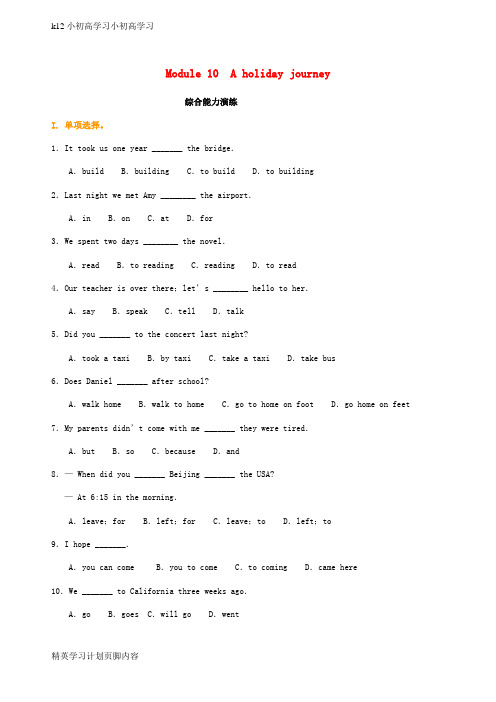
Module 10 A holiday journey综合能力演练I. 单项选择。
1.It took us one year _______ the bridge.A.build B.building C.to build D.to building2.Last night we met Amy ________ the airport.A.in B.on C.at D.for3.We spent two days ________ the novel.A.read B.to reading C.reading D.to read4.Our teacher is over there;let’s ________ hello to her.A.say B.speak C.tell D.talk5.Did you _______ to the concert last night?A.took a taxi B.by taxi C.take a taxi D.take bus6.Does Daniel _______ after school?A.walk home B.walk to home C.go to home on foot D.go home on feet 7.My parents didn’t come with me _______ they were tired.A.but B.so C.because D.and8.— When did you _______ Beijing _______ the USA?— At 6:15 in the morning.A.leave;for B.left;for C.leave;to D.left;to9.I hope _______.A.you can come B.you to come C.to coming D.came here10.We _______ to California three weeks ago.A.go B.goes C.will go D.went11.You had better _______ because you have to drive back home.A.not drinking B.not drinkC.don’t drink D.not to drink12._______ he _______ volleyball last Sunday?A.Does;play B.Did;playedC.Is;playing D.Did;play13.Remember _______ them down when you see them in a passage.A.writing B.to writing C.write D.to write14.— How did they go to school?— _______.A.By the bike B.By a bikeC.By their bikes D.By bike15.I took _______ and ______ them to you.A.many photos;sentB.many photos;sendedC.lots of photoes;sentD.lots of photoes;sendedII. 完形填空。
七年级英语下册知识导学Module10Aholidayjourney词句精讲精练新版外研版
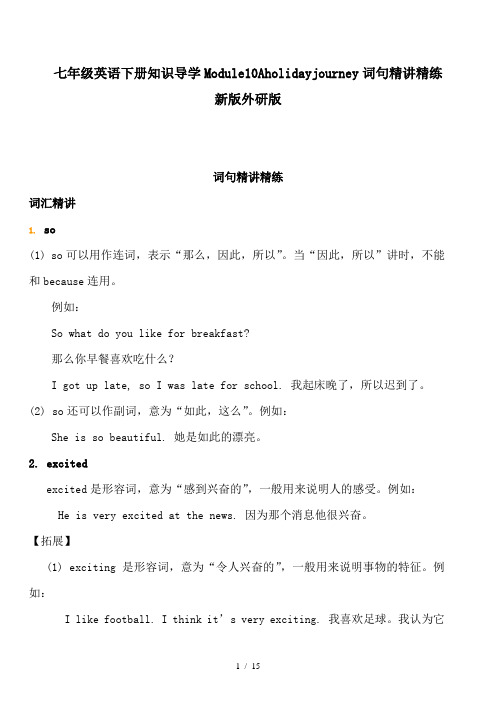
七年级英语下册知识导学Module10Aholidayjourney词句精讲精练新版外研版词句精讲精练词汇精讲1.so(1) so可以用作连词,表示“那么,因此,所以”。
当“因此,所以”讲时,不能和because连用。
例如:So what do you like for breakfast?那么你早餐喜欢吃什么?I got up late, so I was late for school. 我起床晚了,所以迟到了。
(2) so还可以作副词,意为“如此,这么”。
例如:She is so beautiful. 她是如此的漂亮。
2. excitedexcited是形容词,意为“感到兴奋的”,一般用来说明人的感受。
例如:He is very excited at the news. 因为那个消息他很兴奋。
【拓展】(1) exciting是形容词,意为“令人兴奋的”,一般用来说明事物的特征。
例如:I like football. I think it’s very exciting. 我喜欢足球。
我认为它非常令人兴奋。
(2) 英语中,带-ing的形容词,用来形容事物,指某事物的性质、特征,意为“令人……的”“让人……的”,常用事物作主语或作定语修饰物。
而带-ed的是用来形容人的,意为“感到……的”“使人……的”,其主语是人,类似的词有:boring 令人厌烦的 interesting 令人感兴趣的 movingbored(人)感到厌烦的 interested(人)感兴趣的 moved(人)感动的tiring 令人厌倦的 surprising令人惊讶的tired(人)感到疲倦/累/厌烦的 surprised(人)感到惊讶的3. arrivearrive“到达”是不及物动词,后接表示地点的副词时,只能用arrive。
而arrive in后接表示范围较大的地点名词(如country, city等);arrive at后接小地点(如school, hotel, stop等)。
【K12教育学习资料】[学习]七年级英语下册 Module 10 A holiday journey
![【K12教育学习资料】[学习]七年级英语下册 Module 10 A holiday journey](https://img.taocdn.com/s3/m/35d1beb7bceb19e8b8f6ba3c.png)
Module 10______________________________________________________________________________ ______________________________________________________________________________一般过去时(4)一般过去时的特殊疑问句用法在前两个模块中我们主要学习了一般过去时的判定,一般过去时的肯定、否定、一般疑问句及其回答。
本单元主要学习一般过去特殊疑问句的用法。
我们看下面的例句:--When did he die?--He died in 1900.--How long did the rain last?--It lasted four hours.--Why did he come back late?--Because he wanted to finished the work.综上,我们发现一般过去时的特殊疑问句的用法与一般现在时的特殊疑问句在结构上没有太大的差异,只是使用的助动词不同而已。
单项选择1.--__________did you go there?--Two years ago.A.WhenB.WhereC.WhyD.How答案:A解析:考查一般过去时特殊疑问句的用法,根据回答“两年前”故答案是A。
2.--__________did it take to get there?--About nine hours.A.How farB.How oftenC.How longD.How many 答案:C解析:考查一般过去时特殊疑问句的用法,根据回答“9个小时”是时间段故选C。
3.--__________did you buy?--Two bags.A.WhenB.WhereC.WhyD.What答案:D解析:根据句子回答可知是买了什么,故选D。
七年级英语下册导学案:module10Aholidayjourneyunit1
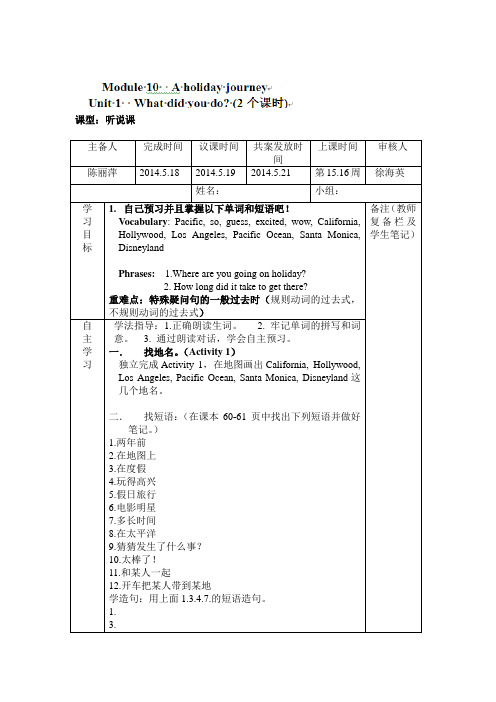
课型:听说课主备人完成时间议课时间共案发放时间上课时间审核人陈丽萍2014.5.18 2014.5.19 2014.5.21 第15.16周徐海英姓名:小组:学习目标1.自己预习并且掌握以下单词和短语吧!Vocabulary: Pacific, so, guess, excited, wow, California, Hollywood, Los Angeles, Pacific Ocean, Santa Monica, DisneylandPhrases: 1.Where are you going on holiday?2. How long did it take to get there?重难点:特殊疑问句的一般过去时(规则动词的过去式,不规则动词的过去式)备注(教师复备栏及学生笔记)自主学习学法指导:1.正确朗读生词。
2. 牢记单词的拼写和词意。
3. 通过朗读对话,学会自主预习。
一.找地名。
(Activity 1)独立完成Activity 1,在地图画出California, Hollywood, Los Angeles, Pacific Ocean, Santa Monica, Disneyland这几个地名。
二.找短语:(在课本60-61页中找出下列短语并做好笔记。
)1.两年前____________________2.在地图上____________________3.在度假____________________4.玩得高兴____________________5.假日旅行____________________6.电影明星____________________7.多长时间______________________8.在太平洋_____________________9.猜猜发生了什么事?_____________10.太棒了!_____________________11.和某人一起___________________12.开车把某人带到某地______________学造句:用上面1.3.4.7.的短语造句。
七年级英语下册知识导学Module10Aholidayjourney综合能力演练(新版)外研版
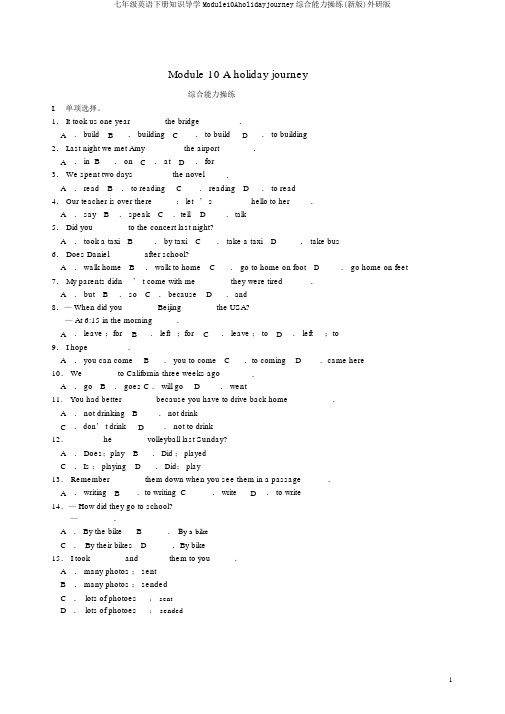
Module 10 A holiday journey综合能力操练I.单项选择。
1. It took us one year _______ the bridge.A. build B. building C. to build D. to building2. Last night we met Amy ________ the airport.A. in B. on C. at D. for3. We spent two days ________ the novel.A. read B. to reading C. reading D. to read4. Our teacher is over there; let’ s ________ hello to her.A. say B. speak C.tell D. talk5. Did you _______ to the concert last night?A. took a taxi B. by taxi C. take a taxi D. take bus6. Does Daniel _______ after school?A. walk home B. walk to home C. go to home on foot D. go home on feet 7. My parents didn’ t come with me _______ they were tired.A. but B. so C. because D. and8.— When did you _______ Beijing _______ the USA?— At 6:15 in the morning.A. leave ;for B. left;for C. leave ; to D. left;to9. I hope _______.A. you can come B. you to come C.to coming D.came here10. We _______ to California three weeks ago.A. go B. goes C . will go D. went11. You had better _______ because you have to drive back home.A. not drinking B. not drinkC. don’ t drink D. not to drink12. _______ he _______ volleyball last Sunday?A. Does;play B. Did ; playedC. Is ; playing D. Did; play13. Remember _______ them down when you see them in a passage.A. writing B.to writing C. write D. to write14.— How did they go to school?— _______ .A . By the bike B.By a bikeC.By their bikes D.By bike15. I took _______ and ______ them to you.A. many photos ; sentB. many photos ; sendedC.lots of photoes;sentD.lots of photoes;sendedII.完形填空。
七年级英语下册 知识导学 Module 10 A holiday journey词句精讲精练 (新版)外研版.doc
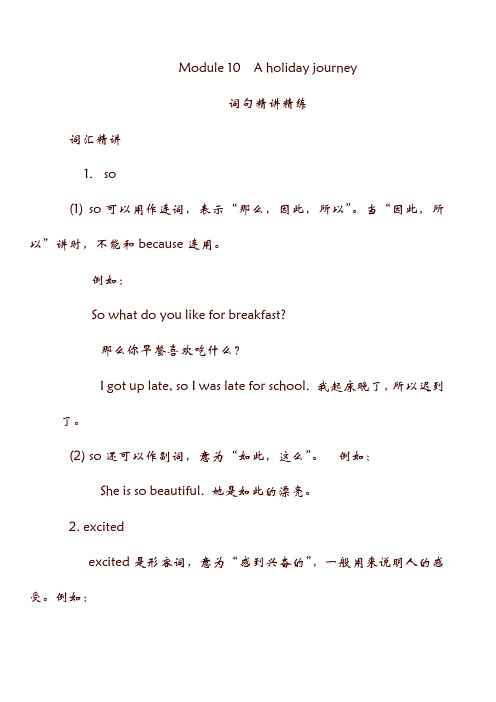
Module 10 A holiday journey词句精讲精练词汇精讲1.so(1) so可以用作连词,表示“那么,因此,所以”。
当“因此,所以”讲时,不能和because连用。
例如:So what do you like for breakfast?那么你早餐喜欢吃什么?I got up late, so I was late for school. 我起床晚了,所以迟到了。
(2) so还可以作副词,意为“如此,这么”。
例如:She is so beautiful. 她是如此的漂亮。
2. excitedexcited是形容词,意为“感到兴奋的”,一般用来说明人的感受。
例如:He is very excited at the news. 因为那个消息他很兴奋。
【拓展】(1) exciting是形容词,意为“令人兴奋的”,一般用来说明事物的特征。
例如:I like football. I think it’s very exciting. 我喜欢足球。
我认为它非常令人兴奋。
(2) 英语中,带-ing的形容词,用来形容事物,指某事物的性质、特征,意为“令人……的”“让人……的”,常用事物作主语或作定语修饰物。
而带-ed的是用来形容人的,意为“感到……的”“使人……的”,其主语是人,类似的词有:boring 令人厌烦的interesting 令人感兴趣的moving 令人感动的bored(人)感到厌烦的interested(人)感兴趣的moved(人)感动的tiring 令人厌倦的surprising令人惊讶的tired(人)感到疲倦/累/厌烦的surprised(人)感到惊讶的3. arrivearrive“到达”是不及物动词,后接表示地点的副词时,只能用arrive。
而arrive in后接表示范围较大的地点名词(如country, city等);arrive at后接小地点(如school, hotel, stop等)。
【配套K12】[学习]七年级英语下册 Module 10 A holiday journey(语法篇
![【配套K12】[学习]七年级英语下册 Module 10 A holiday journey(语法篇](https://img.taocdn.com/s3/m/556b0886d1f34693daef3eb4.png)
Module 10______________________________________________________________________________ ______________________________________________________________________________一般过去时(4)一般过去时的特殊疑问句用法在前两个模块中我们主要学习了一般过去时的判定,一般过去时的肯定、否定、一般疑问句及其回答。
本单元主要学习一般过去特殊疑问句的用法。
我们看下面的例句:--When did he die?--He died in 1900.--How long did the rain last?--It lasted four hours.--Why did he come back late?--Because he wanted to finished the work.综上,我们发现一般过去时的特殊疑问句的用法与一般现在时的特殊疑问句在结构上没有太大的差异,只是使用的助动词不同而已。
单项选择1.--__________did you go there?--Two years ago.A.WhenB.WhereC.WhyD.How答案:A解析:考查一般过去时特殊疑问句的用法,根据回答“两年前”故答案是A。
2.--__________did it take to get there?--About nine hours.A.How farB.How oftenC.How longD.How many 答案:C解析:考查一般过去时特殊疑问句的用法,根据回答“9个小时”是时间段故选C。
3.--__________did you buy?--Two bags.A.WhenB.WhereC.WhyD.What答案:D解析:根据句子回答可知是买了什么,故选D。
- 1、下载文档前请自行甄别文档内容的完整性,平台不提供额外的编辑、内容补充、找答案等附加服务。
- 2、"仅部分预览"的文档,不可在线预览部分如存在完整性等问题,可反馈申请退款(可完整预览的文档不适用该条件!)。
- 3、如文档侵犯您的权益,请联系客服反馈,我们会尽快为您处理(人工客服工作时间:9:00-18:30)。
Module 10 A holiday journey词句精讲精练词汇精讲1.so(1) so可以用作连词,表示“那么,因此,所以”。
当“因此,所以”讲时,不能和because连用。
例如:So what do you like for breakfast?那么你早餐喜欢吃什么?I got up late, so I was late for school. 我起床晚了,所以迟到了。
(2) so还可以作副词,意为“如此,这么”。
例如:She is so beautiful. 她是如此的漂亮。
2. excitedexcited是形容词,意为“感到兴奋的”,一般用来说明人的感受。
例如:He is very excited at the news. 因为那个消息他很兴奋。
【拓展】(1) exciting是形容词,意为“令人兴奋的”,一般用来说明事物的特征。
例如:I like football. I think it’s very exciting. 我喜欢足球。
我认为它非常令人兴奋。
(2) 英语中,带-ing的形容词,用来形容事物,指某事物的性质、特征,意为“令人……的”“让人……的”,常用事物作主语或作定语修饰物。
而带-ed的是用来形容人的,意为“感到……的”“使人……的”,其主语是人,类似的词有:boring 令人厌烦的 interesting 令人感兴趣的 moving 令人感动的bored(人)感到厌烦的 interested(人)感兴趣的 moved(人)感动的tiring 令人厌倦的 surprising令人惊讶的tired(人)感到疲倦/累/厌烦的 surprised(人)感到惊讶的3. arrivearrive“到达”是不及物动词,后接表示地点的副词时,只能用arrive。
而arrive in后接表示范围较大的地点名词(如country, city等);arrive at后接小地点(如school, hotel, stop等)。
【拓展】(1) get to 意为“到达……”。
其后接表示地点的副词(如here; there; home等)时,介词to要省略。
例如:They’ll get to Beijing at six tonight. 他们将在今晚六点到达北京。
I’ll get there on time. 我会按时到达那里。
(2) reach是及物动词,可以直接接宾语。
例如:I’ll call you as soon as I reach New York. 我一到达纽约就给你打电话。
4. such assuch as意为“例如”,用来罗列同类人或物中的几个例子,可置于被列举的事物与前面的名词之间,但such as后边不能用逗号。
例如:I have many hobbies, such as reading, dancing and singing.我有很多爱好,如读书,跳舞和唱歌。
Many of the English programs are welcome, such as Follow Me, Follow Me to Science.其中有许多英语节目很受欢迎,例如《跟我学》、《跟我学科学》。
English is spoken in many countries, such as Australia, Canada and so on.许多国家说英语,如澳大利亚加拿大等。
【拓展】for example也意为“例如”,但是强调“举例”说明,而且一般只举同类人或物中的一个作为插入语,且用逗号隔开。
for example可置于句首、句中或句末。
例如:There are many kinds of pollution, for example, noise is a kind of pollution.有许多种污染方式,例如噪音就是一种污染。
Many students like playing computer games,for example,Mike.许多学生喜欢玩电脑游戏,比如迈克。
5. till/untiluntil和till两者都可作介词、连词,一般情况下可以互换使用。
用于肯定句时,主句的动词只用延续性的,它所表示的动作一直延续到till或until表示的时间为止,意为“直到……为止”;用于否定句时,主句的动词一般是非延续性的,也可以是延续性的,它所表示的动作直到till或until所表示的时间才发生,意为“直到……(才)”。
例如:I slept until midnight. 我一直睡到半夜时醒了。
Wait till I call you.等着我叫你。
People do not know the value of health till they lose it.直到失去健康,人们才知道健康的可贵。
She didn’t arrive until 6 o’clock. 她直到6点才到。
Don’t get off the bus until it has stopped. 公共汽车停稳后再下车。
I didn’t wake up until I heard the alarm clock.直到听到闹钟的铃声我才醒来。
【注意】until可用于句首,而till通常不用于句首。
6. wonderfulwonderful是形容词,意为“绝妙的,了不起的”,在句中常作定语或表语。
例如:We had a wonderful time. 我们玩得快活极了。
The weather was wonderful yesterday. 昨天天气好极了。
【拓展】wonder的用法:(1) wonder作不及物动词,意为“感到惊异,感到惊讶”,常与介词at连用。
例如:I wondered at his doing that. 我对他那样做感到惊讶。
(2) wonder作及物动词,意为“想知道,对……感到奇怪,对……感到疑惑”,后跟wh-to do sth.或wh-从句。
例如:He wondered what to do next. 他想知道接下来做什么。
I wonder whether he will come. 我想知道他是否会来。
7. learn aboutlearn about 意为“学习,获得,学得,得知有关…的消息”。
例如:She can learn about Chinese history.她能学习到中国历史方面的知识。
First, we must learn about the weather here.首先,我们必须了解这里的天气。
8. do shoppingdo shopping意为“购物”。
例如:The children are looking forward to doing shopping. 孩子们正期待着去购物。
【拓展】动词do后跟动名词形式构成短语,动名词作do的宾语,具有名词性质,可以用some或the 修饰。
例如:do some reading阅读 do some washing洗涮 do some cooking做饭do some swimming游泳 do some speaking多说 do some listening多听词汇精练I. 英汉互译。
1. 度假_________________2. 两年前_________________3. 多长时间_________________4. by plane _________________5. at home _________________6. 例如_________________7. 散步_________________ 8. buy a present for you_________________9. 购物_________________ 10. 首先_________________II. 根据所给首字母或汉语提示完成单词。
1. I was so e_________________ about the good news.2. Can you _________________(猜出) the answer to the question?3. When did you a_________________ in Shanghai?4. There’s no homework today and you can _________________(放松) at home.5. Yesterday the rich man _________________(卖掉) his car.6. I had a w_________________ time yesterday.7. There are many _________________(太平洋的) islands in the world.8. — Can you speak F_________________?— No, I can’t. I can only speak English and Chinese.9. Yesterday I visited a famous _________________(宫殿).10. The Eiffel Tower is w_________________. I visited it last year.III. 用方框中所给词语的适当形式填空。
1. Please ________________ it to my bedroom. I don’t want it here.2. Listen! I’m sure I can hear ________________ outside.3. They wanted ________________ the farthest island.4. ________________ films did you see?5. ________________ money do you have now?6. Please tell him to call me ________________ he comes back.7. ________________ did you to go school yesterday?8. The meeting ________________ at two o’clock tomorrow afternoon.9. How long did the rain ________________ last night?10. I ________________ with my friends yesterday.IV. 用所给词的适当形式填空。
